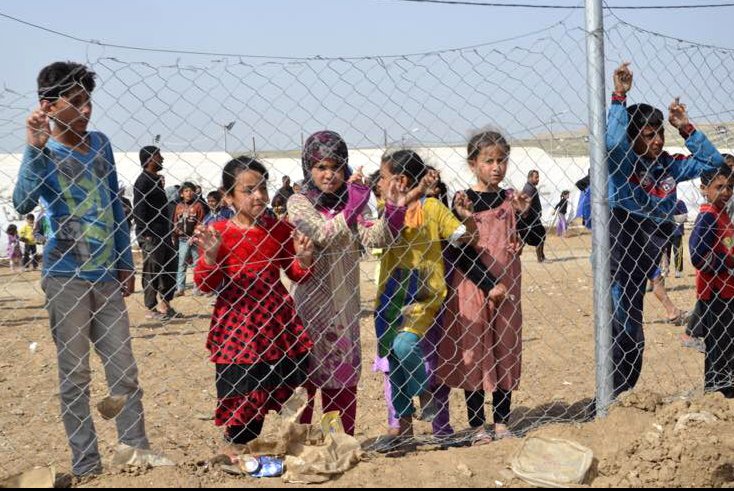Iraqi displaced children from Mosul, who were forced to flee their homes due the fighting between Iraqi forces and Islamic state group, were living at the Hamam al-Alil camp on April 7. Many children have been orphaned in the conflict. File Photo by Omar al-Hayali/EPA
BAGHDAD, Iraq, Aug. 14 (UPI) -- Abdallah, Mariam and Rahma are younger than 1 year old and their identities are unknown. They were rescued from the rubble as Iraqi forces battled to wrest control of Mosul's old city from Islamic State militants. The three toddlers were given names at the orphanage where tens of children left orphaned by the 9-month-long war to end IS's control of Iraq's second-largest city are harbored.
"Scores of children have lost their parents in the intense bombardment or in booby traps and suicide bombings perpetrated by ISIS. We have given them names to facilitate sorting them out until we can establish their identity and trace their kin to hand them over," said Sukaina Mohamad Ali, the head of the Office of Women and Children in Nineveh province.
Ali, who also runs the biggest orphanage in Mosul, said the organization received children found by Iraqi forces in the debris and near dead bodies. "Most of them had no ID, so we don't know who they are," she said. "They were in a very precarious state suffering from malnutrition and thirst."
Among Mosul's orphans, many are the children of foreign and local IS fighters killed in battle. "We don't know their exact number because they are dispersed in several refugee camps but there are at least 600 of them staying in Hammam al Alil camp," Ali said.
"We received 20 boys who ISIS kidnapped from their families to recruit in their children's unit, the Fetiyen al Jinneh. They are aged 8-11 and we were able to identify them and reunite them with their families."
Some of the children at the orphanage were Yazidis held by IS. Others were Chechen or from different Arab nationalities and were taken to Baghdad. The orphanage is expecting 1,700 additional orphans in the next stage.
In addition, some 1,500 women married to slain IS fighters, including 10 who are pregnant, sheltered in al-Jadaa refugee camp, fearing reprisals from locals, Ali said.
"The scale of social problems facing Iraq in post-ISIS areas is overwhelming. Revenge acts can be expected by families who suffered at the hands of the militants no matter how much the government tries to prevent such acts," she said.
While there is no government plan to deal with the problem, attempts have been made to identify the children by posting photos on social media. "We used all possible means and we succeeded in identifying many, especially those aged between 6 and 8," Ali said.
The children are sometimes harbored in private homes by families, volunteer workers and individuals such as Iraqi soldier Mohamad Saleh.
"While we were battling in the old city we discovered many children alone near the corpses of women. I took home a 3-year-old boy called Ahmad while his 1-year-old brother was transferred to a hospital in Erbil," Saleh said.
"I posted Ahmad's photo on social media, which allowed his uncles to identify him. They took him away after showing me papers proving their relationship."
The near total absence of psychological or psychiatric services that could treat the myriad traumas of war will make Iraq's children an even more vulnerable generation.
Hamida Ramadhani, UNICEF's deputy representative in Iraq, said the "children's deep physical and mental scars" would take years and strong efforts to heal.
"Some 650,000 boys and girls, who have lived through the nightmare of violence in Mosul, have paid a terrible price and endured many horrors over the past three years. The needs and the future of these children must remain a top priority in the weeks and months to come," Ramadhani said.
She said UNICEF has seen a considerable increase in the number of extremely vulnerable unaccompanied children arriving at medical offices and reception areas. They are referred immediately to humanitarian organizations so they can be assisted and where possible reunited with their families.
Abir al-Jalabi, director of childcare at the Ministry of Labor and Social Affairs, said the government does not have statistics on orphaned children in Mosul because of persisting unstable security in the city.
"We know for sure that the number is very big. The ministry has anticipated the needs and equipped several orphanages in the city but we need to set up new facilities in view of the large numbers," Jalabi said.
Khalaf al-Hadidi, a member of Mosul's municipal council, acknowledged that the issue of orphans is a complex matter that requires local and international effort. "We need to learn from the experiences of other countries that faced the same challenge. This necessitates lots of resources, both financial and human, which Iraq is short of," he said.
This article originally appeared at The Arab Weekly.















